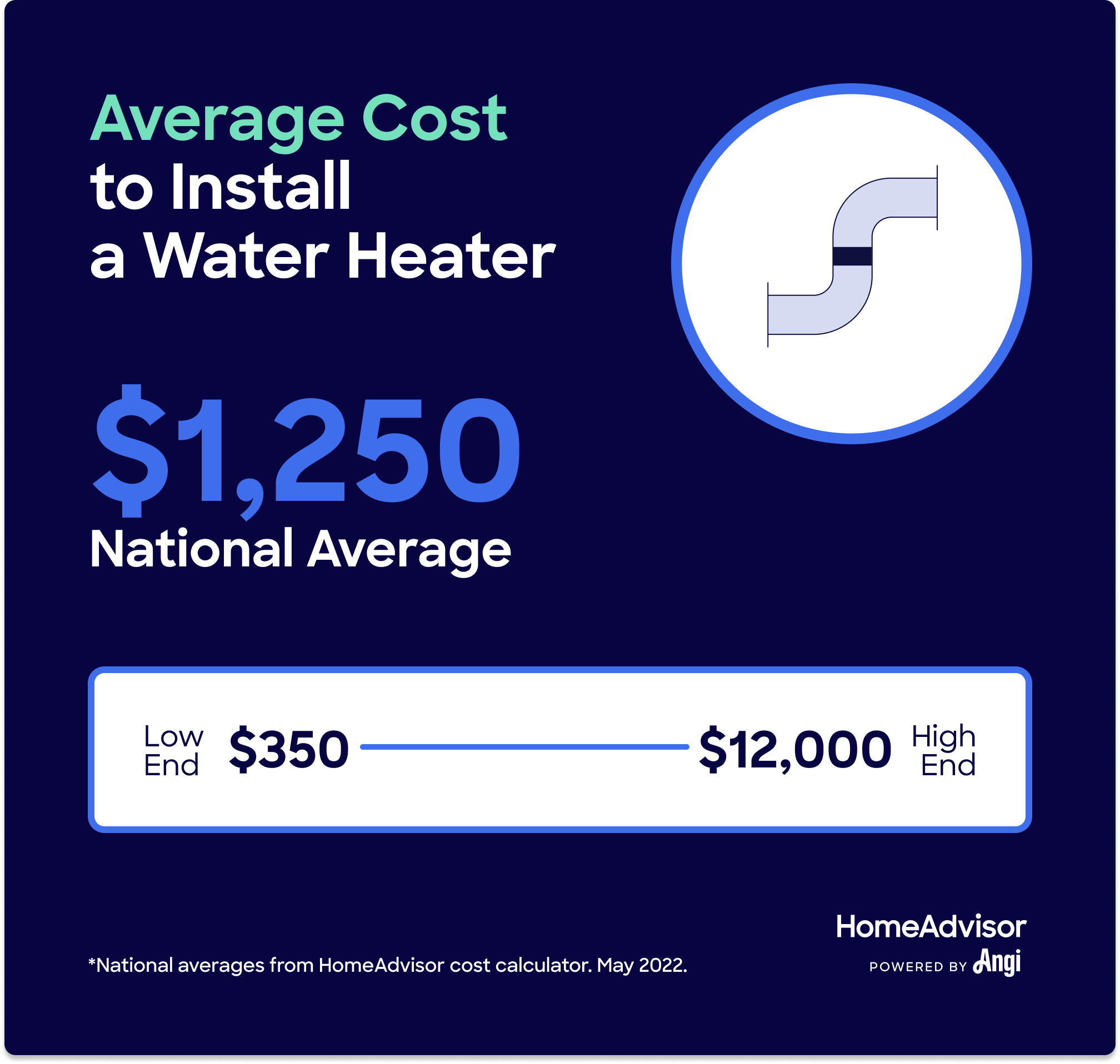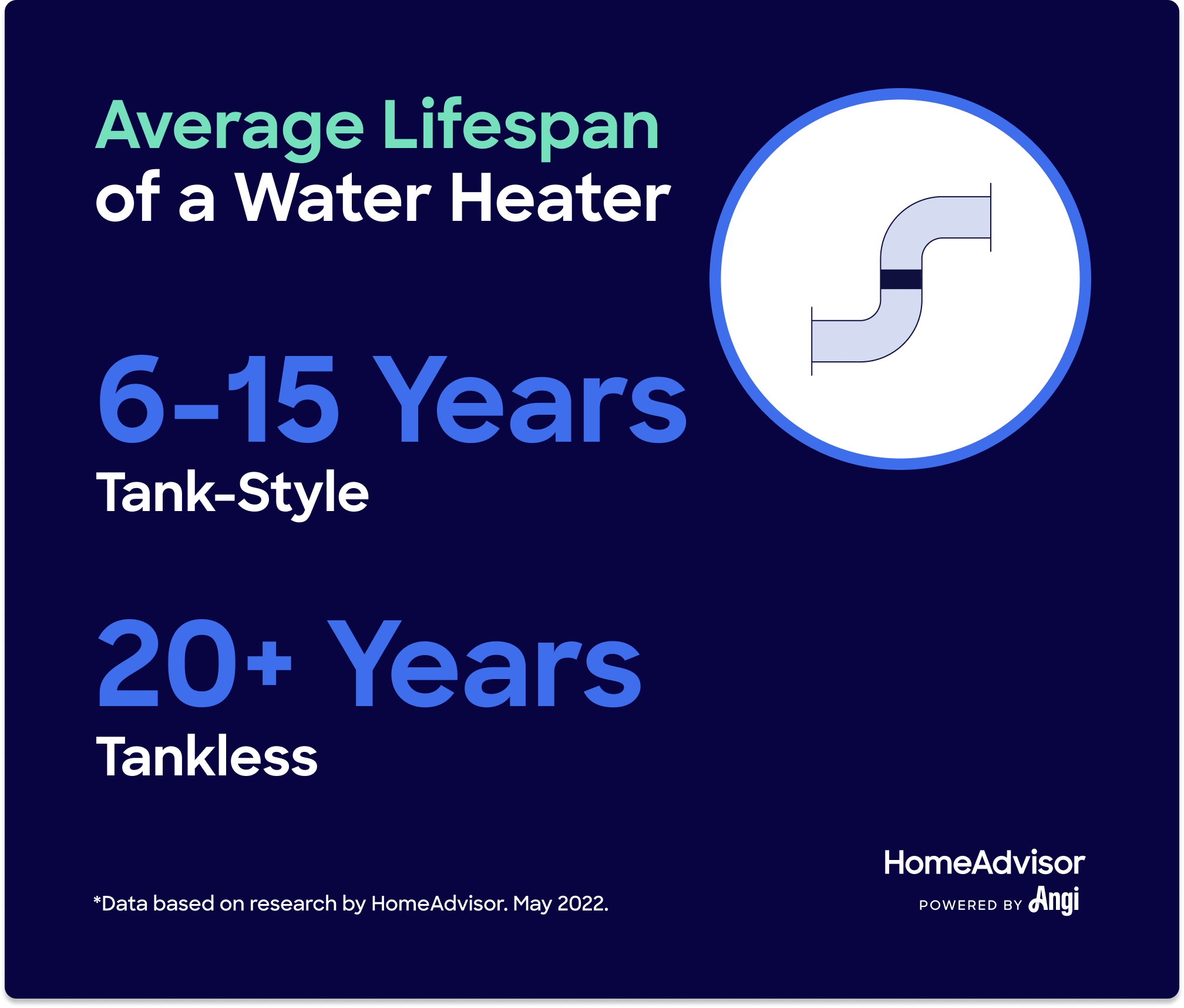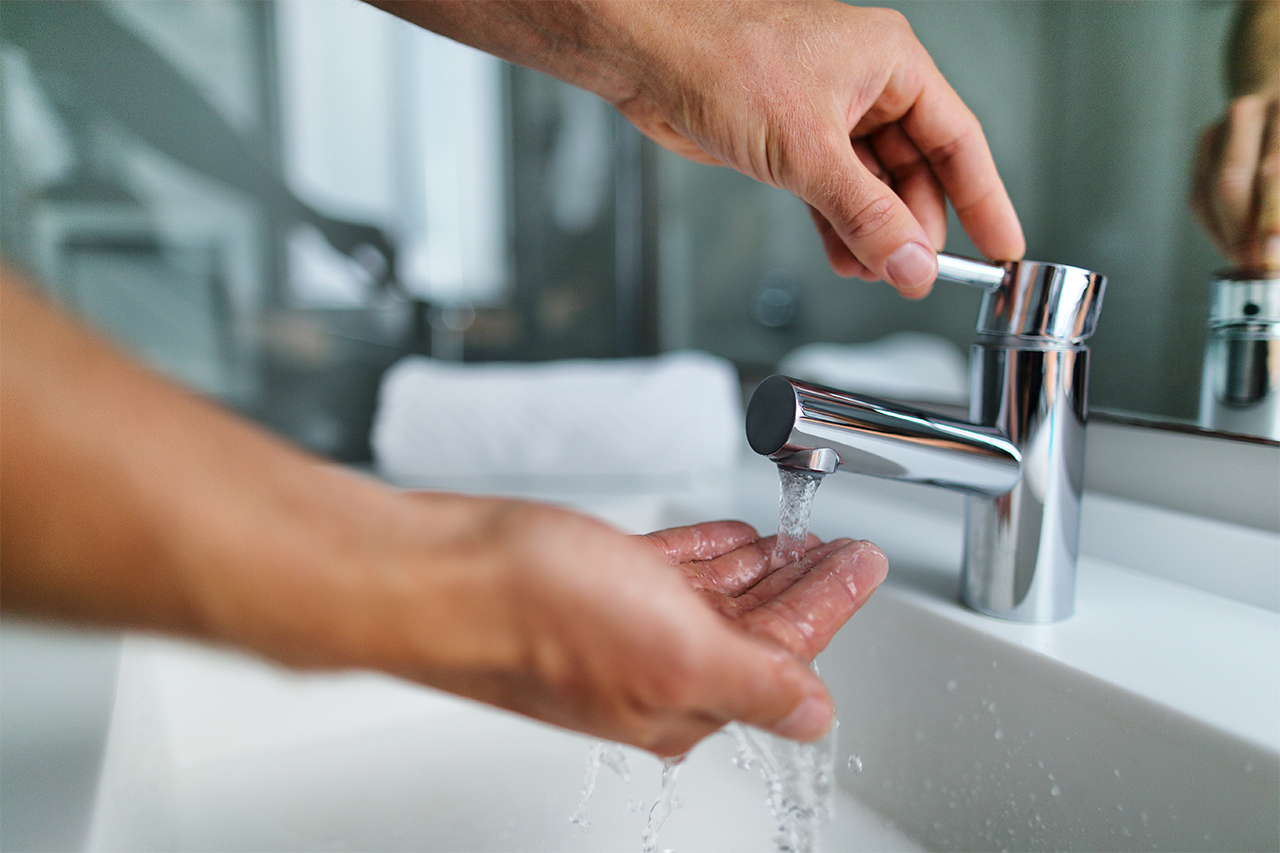How Much Does It Cost to Install or Replace a Water Heater?
Typical Range:
$880 - $1,776
Typical Range:
$880 - $1,776
Cost data is based on actual project costs as reported by 32,397 HomeAdvisor members. Embed this data
.
.
.
.
.
.
.
.
.
.
.
.
.
.
.
.
.
.
.
.
.
.
.
.
.
.
.
.
.
.
•
•
•
•
Updated July 29, 2022
Reviewed by Jeff Botelho, Licensed Journeyman Plumber.Installing a water heater replacement costs between $880 and $1,776, or an average of $1,301, for a tank-based unit and labor. However, your actual price will depend largely on the size and type of heater you choose.
Larger units typically cost more, and other features and upgrades may drive the price up to $2,000 for the heater alone. Tankless water heaters cost an average of $1,000 to $3,500, including labor.
To arrive at your total cost, add together the price of your unit and roughly $45 to $150 per hour to hire a plumber. Note that labor costs may increase if your project requires additional venting, plumbing, or electrical work. Below, we’ll discuss all the factors that play into the overall cost of installing a water heater so you can choose the best option for your home and budget.
Let's calculate cost data for you. Where are you located?
Where are you located?
| National Average | $1,301 |
| Typical Range | $880 - $1,776 |
| Low End - High End | $350 - $13,000 |
Cost data is based on actual project costs as reported by 32,397 HomeAdvisor members.
Tank-style water heaters cost an average of $1,000, while tankless styles cost about $2,500. Tankless heaters heat the water as needed, and tank styles keep water hot in a large tank, usually 40 to 60 gallons at a time.
| Tank | Tankless (Whole House) | |
|---|---|---|
| Cost (materials + labor) | $650 – $2,500 | $1,200 – $3,500 |
| Lifespan | 6 – 15 years | 20+ years |
| Energy Source | Gas, Propane, Electric, Solar | Gas, Electric, Propane |
| Installation Time | 1 – 3 hours | 2 – 3 hours* |
*This is the installation time for a replacement unit. Conversions from tank to tankless take up to double this time. If installing parallel or point-of-use units, add one hour extra for each.
A traditional tank-style water heater costs $1,000 to $1,500, while a high-efficiency or hybrid style costs up to $2,500 with installation. Tank-style heaters keep the water hot, so it’s ready when you need it. They’re great options for:
Cold climates
Homes without gas
Homes with high water demands
The cost of a tankless water heater installation is $1,200 to $3,500, including the unit. Tankless styles are great options in temperate climates. However, technology is quickly improving to make this efficient style an excellent choice in almost any home. On-demand, point-of-use tankless types cost as little as $300 installed but only heat water for one place, like a washer or a shower.
Replacement hot water heaters cost $550 to $3,500 or more, including the unit and labor. Light-duty commercial types add $1,000 or more to the overall price but stand up to more constant use. Most replacement electric and gas water heater units cost $550 to $1,500. However, they can range anywhere from $450 to $3,500, depending on the type.
| Tank Size (Gallons) | Cost Range |
|---|---|
| 30 | $550 – $2,100 |
| 40 | $550 – $2,350 |
| 50 | $650 – $2,400 |
| 75 | $1,250 – $3,500 |
| 80 | $1,350 – $3,500 |
You can find the size you need based on your water demand. For most two-person homes, 40 to 50 gallons works fine. For tankless installs, follow the chart below and consider using multiple units or point-of-use units to boost capacity. For example, you may use one large on-demand unit for most needs and a small point-of-use unit at your main shower.
| People in Household | Tank (Gallons) | Tankless* (Gallons per Minute) |
|---|---|---|
| 1 | 20 – 30 | 2 – 3 |
| 2 – 3 | 30 – 40 | 3 – 5 |
| 4 – 5 | 40 – 50 | 4 – 6 |
| 6+ | 55+ | 5+ |
*May require two or more parallel units or point-of-use units for the shower, bathroom, or appliances.
Water heater costs vary with the fuel type—natural gas, propane, or electric. While all three start at about $600, they can go up to $3,500.
| Fuel Type | Cost (Materials & Labor) |
|---|---|
| Natural Gas | $600 – $2,700 |
| Propane | $700 – $2,500 |
| Electric | $600 – $3,500 |
The prices in the table above do not include installation or hookup of utilities. Expect to pay for those on top of the cost of the unit, labor, and materials. The following are the costs to install a gas or electrical line:
Gas line installation costs $300–$1,500
Electrical line installation costs $500–$1,000
Natural gas water heaters cost $600 to $2,700 on average, including the unit, labor, and installation materials. They last six to 15 years and have a slightly higher recovery rate than electric types. With natural gas prices nearly tripling recently, it’s impossible to tell how much it’ll cost to use one annually, but rates are quickly outpacing electricity rates.
Natural gas water heaters are slightly faster at heating water in on-demand tankless types than electric but are only about 60% to 70% energy efficient for standard models. If you have a continuous pilot light type or one that doesn’t require external electricity to light, it’ll work during a power outage.
Propane water heaters cost $500 to $2,500 on average, with labor and materials. You’ll spend about $600 to $800 a year to run one, although fuel prices fluctuate regionally throughout the year.
They’re the same model as a natural gas unit, and you can convert them between the two. However, they’re usually for rural areas without natural gas or off-grid installs. They’ll often work during a power outage if you have a continuously burning pilot light.
The cost of an electric water heater is approximately $600 to $3,500. You can purchase point-of-use units for as little as $200, with installation bringing that to $300 to $400, but they only heat one spot, like a shower. Electric units last six to 15 years. As of May 2022, average electricity rates are 13.83 cents per kilowatt hour, meaning the average home will spend about $800 a year running one. Electric water heaters are about 95% energy efficient.
High-efficiency water heaters cost an average of $1,500 to $3,000, including the unit and labor. They’re anywhere from 100% to 300% more efficient than conventional water heaters, depending on whether you go with a hybrid, indirect, or solar.
"There are many high-efficiency options on today's market that are worth a look, especially when you realize that water heaters are the second-highest source of energy consumption in the home,” says Dan DiClerico, Smart Home Strategist and Home Expert.
| Type | Cost (Materials & Labor) |
|---|---|
| Solar | $1,700 – $5,500 |
| Indirect | $1,200 – $3,500 |
| Hybrid Heat Pump | $1,200 – $3,500 |
Solar water heater installation costs $1,700 to $5,500 on average but can easily hit $13,000 or more for large homes. This style has become popular for living off-grid. You might supplement your system with a solar tank or tube-style heater. While these are very expensive, they cost almost nothing to run, so they pay for themselves over time.
Indirect water heaters cost $1,200 to $3,500 on average. This extremely efficient choice consists of a tank that runs on a boiler, furnace, or solar energy, rather than relying on an independent heat source. It’s also the most inexpensive method for heating water for a home.
“Indirect heaters use a coil-type heat exchanger inside the tank which is piped to a boiler and heats the water in the tank,” said Jeff Botelho, Expert Review Board Member and plumber. “These are the most efficient tank-type water heaters available, but they require a hot water boiler for operation.”
Hybrid heat pump water heaters cost $1,200 to $3,500 on average. They pull heat into the water from the air around the unit and are extremely efficient. However, they need quite a bit of space to work—up to 1,000 square feet.
For a standard water heater installation, expect to pay about $150 to $450. Replacing a tankless style with a similar model costs $600 to $1,850 in labor. However, for conversions from a tank-style to a tankless, you might pay up to $2,500.
Most plumbers quote a flat rate based on how long they think it will take to install the new water heater, plus travel time, labor, and any materials needed. It’ll take one to four hours to install without complications, regardless of the fuel type or the tank style. Tankless water heaters can cost about double in labor but take about the same amount of time to install. If issues come up, such as the need to reroute an existing line or install a new circuit, the project time can quickly double.
Hiring a plumber costs $45–$200 per hour
Electricians cost $50–$100 per hour
Replacing a water heater usually costs $500 to $1,800 for a replacement of the same style and size. Other costs, including permit fees and carpentry work, can add anywhere from $50 to $1,500 or more.
Converting from one fuel source to another often includes one or more of the following:
Adding electrical wiring fees: $550–$2,300
Water line installation costs: $350–$1,900
Gas line addition price: $275–$825
Permits: $100–$1,500, depending on the type and extent of the work you’ll do.
Expansion tanks: $40–$350. These are often required in new construction or when updating.
Carpentry work. You might need to frame a new wall, enclose or open a space, or simply add drywall to a utility closet.
Framing a wall costs: $200–$400.
Drywall installation costs: $1,000–$2,900.
| City | Cost | Percent of National Average |
|---|---|---|
| New York | $1,000 – $1,700 | 106% |
| Boston | $1,050 – $1,950 | 119% |
| San Francisco | $1,150 – $2,100 | 128% |
| Boise, ID | $1,400 – $2,150 | 141% |
| Chicago | $800 – $1,400 | 87% |
| Dallas | $1,050 – $1,900 | 115% |
| Minneapolis | $800 – $1,600 | 94% |
| Washington, DC | $950 – $1,900 | 113% |
| Jacksonville, FL | $700 – $1,200 | 73% |
| Rheem | $400 – $2,300 |
| AO Smith | $400 – $3,500 |
| Bradford White | $400 – $3,000 |
| Kenmore | $350 – $1,000 |
| Whirlpool | $350 – $1,500 |
The costs above are estimates for the unit only. They are for the common 30- to 50-gallon capacity units and do not include installation, transportation, or other additional expenses.
Additional factors, such as power venting, permits, and adding an expansion tank, may add to the cost. But contractors usually include these items in their estimate. Ask your contractor for clarification if any of these factors don’t appear in the estimate.
| Factor | Cost |
|---|---|
| Direct & power vent | Adds $500 – $1,000+ |
| Permits | $50 – $150 |
| Expansion tank | $100 – $350 |
| Relocation | $150 – $3,400 |
| Changing fuel type | $500 – $2,000 |
| Additional warranties | $100 – $300 |
Power venting a water heater costs about $500 to $1,000 more than a passive system. “A direct vent system brings combustion air from outside and exhausts directly to the outside of the building,” says Botelho. Direct vent heaters use two pipes—one for combustion and makeup air and the other for exhaust.
Most locations require permits to replace a water heater, typically costing $50 to $150. Check with your local requirements before you begin; some limit installation or replacement to a licensed plumber.
A water heater expansion tank costs $100 to $350 for both parts and labor. When water heats up and enters the system, it increases the pressure. The expansion tank then absorbs some of that pressure and overflow to keep pressure in the system down.
Relocating a water heater means adding water lines, electrical outlets, or gas lines (if they are not preexisting in the new location). Here are the average costs of those factors:
Electrical outlet installation costs $150–$500
Gas line installation costs $300–$900
Water line installation costs $400–$2,000
Changing fuel types means running new lines to the home or expanding on what’s already there so you can change the fuel powering your water heater.
Going from gas to electric costs $500–$2,000 and involves adding a new circuit.
Going from electric to gas costs $500–$1,500 and involves adding new gas pipes.
Optional warranties run anywhere from $100 to $300. It can extend the coverage of your water heater, add free inspections if you purchase it through your plumber, and extend the protection of your investment. Some manufacturers offer a warranty, or your plumber might offer additional coverage through their shop.
Removing the water heater currently in your home costs between $100 and $500. The price will depend on your contractor’s hourly rate. If the unit is hard to access or difficult to remove, expect to pay more for removal.
Leave water heater installation to the pros. You’re hooking up two major utilities—water and gas or electric—to an appliance. If done incorrectly, you can cause water damage to your home, electrical system, and yourself. Hire a local plumber to install your water heater. Not only will it get done properly, but reputable, licensed plumbers warranty their work and carry insurance in case anything goes wrong.
"As a licensed plumber with nearly twenty years in the field, I've seen and repaired dozens of DIY-installed water heaters,” said Botelho. “It has long been my opinion that a knack for mechanical work is no substitute for professional training. Installing a water heater—or any plumbing appliance or fixture—is not a hobby project to be tackled on a Sunday. Any time a job involves connections to major utilities (including gas, oil, or line voltage electricity) it should be done by a licensed and trained professional."
In most cases, an on-demand water heater is the best option for smaller spaces. You’ll save space since there’s no tank, benefit from endless hot water, and enjoy its relatively long lifespan. Tankless water heaters’ energy efficiency also means you’ll save between 24% and 34% on utility costs.
Water heater services cost $100 to $300 on average. Get an annual flush to extend the life of your water heater. Expect to pay between $75 and $200 for your annual flush to increase its longevity and ensure optimal performance for the next 12 months.
Different brands, models, and situations show different signs that your water heater is failing. But, in most cases, you’ll know you need a new water heater when:
Water is rusty or discolored, or there’s a strange metallic taste
Water isn’t heating up enough or at all
Loud pops and cracks
It leaks—get it replaced immediately
It’s 10 years old or older
It’ll take anywhere from 30 minutes to two hours for a water heater to heat up. This is called the recharge rate. Gas units generally recharge faster than electric ones. However, other models may heat up faster. For example, tankless water heaters only need a few seconds before sending warm water to your faucet or showerhead.
In general, you should replace your gas or electric water heater every eight to 12 years, and your tankless water heater after about 20 years. No matter which type you have, you should always follow best practices for having your water heater inspected or serviced to maximize its longevity.


